Ellen and Jim Have a Blog, Too
We are two part-time academics. Ellen teaches in the English department and Jim in the IT program at George Mason University.


Utter contempt: how the audience for Austen films is being treated · 22 January 08
Dear Fanny,
What I’ve been most impressed by thus far in the PBS presentation of a group of film adaptations of Jane Austen’s novels and life is the utter contempt with which the program-makers are treating (and thus regard) their audience.
This is centrally shown by the ways these minimalist tight-budget movies have been cut. I watched the Granada/WGBH NA (script Andrew Davies, directed Jon Johns) on Sunday night, and continually the movie was clipped and spliced. To cite those I could catch:
In the version that aired on British TV, Catherine and Mrs Allen first get themselves a seat where they know no one and among other famous statements, Mrs Allen says she wishes she knew the people (words to this effect) and Catherine, she wishes they knew someone. When Isabella and Catherine first meet, we have the scene where they chase the young men and Isabella complains about the traffic. The scene where Catherine is taking a bath in a tub and dreams of herself naked in front of Henry was cut. A moving moment when Catherine leaves Bath and the kind companionship of Mrs Allen was cut. When Catherine is late to dinner at the Abbey that first night, there is a frightening explosive moment with the General in the hall. Cut. Part of the first moments they sit down to dinner. When the general leaves the Abbey, the young people go into the garden, Henry climbs a tree and throws apples down, one of the most delightful moments in the film, gone.
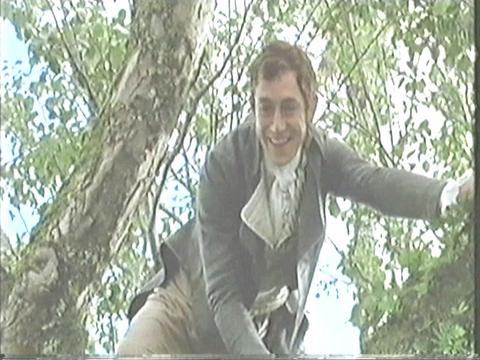
Henry Tilney (J. J. Feilds) throwing apples down to the girls from a tree in a meadow near the abbey
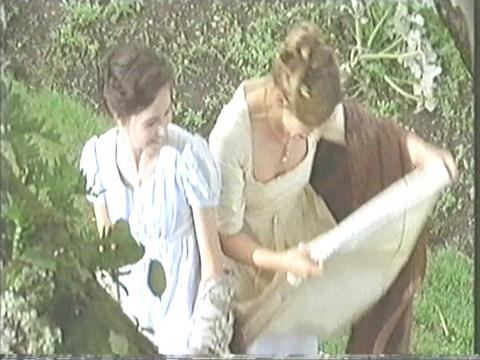
Catherine Morland (Felicity Jones) and Eleanor Tilney (Catherine Walker) catch said apples
The burning of the Radcliffe’s Udolpho cut (not that I minded that, but it was part of Davies’ conception). Little bits of music cut continually.
A more complete list is on Austenblog.
I’m told the DVD being sold in the US leaves these cuts in place. Doubtless leaving out of this material was deliberate; unlike the continual cutting ands splicing of the already similarly minimalist (frantically hurried at the close) 2007 Persuasion (script Simon Burke, directed by Adrian Shergold), Catherine in the bathtub, Catherine naked, the apple scene would catch attention and thus lead to PBS being blamed by more people for 1) cutting the films; and 2) having films with open sex! and also bits not in the book :(
A friend who has watched the 2007 Persuasion more often than I have done confirmed its jolty and partly incoherent nature came from similar continual crude splicing and cutting. It’s said the DVD sold in the US does restore these cuts. The scenes left out are not strikingly memorable in the same way. But among the pieces cut were most of Wentworth’s letter! Only the opening was left; in the British version Rupert Henry-Jones’s voice over was eloquent for the whole.
I’d liken all three of these movies (the 2007 Mansfield Park, script Maggie Wadey, directed by Iain McDonald, too) to a small story that might be found in a normal mini-series. They are like fragments broken off—reminding me of the relationship of Lafayette’s Princess de Cleves to Scudery’s Clelia. La Princesse de Cleves could easily be an inset story told as a whole or woven into Clelia. In such fragments, every moment counts.
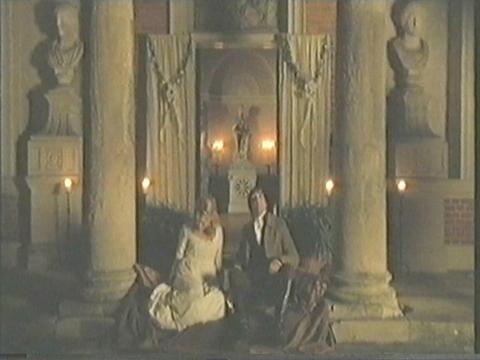
Blake Ritson (Edmund Bertram) and Fanny Price (Billie Pipe) star-gazing (Mansfield Park, 2007)
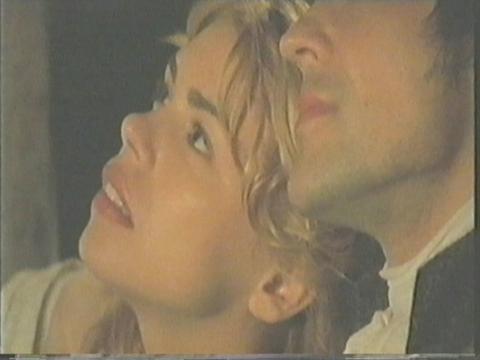
Close-up
The appearance and demeanor of the introducer, Gillian Anderson, her talks and inset commercials (if we needed more evidence) show how little respect the PBS stations now have for their audience. Their original goal which was to have an alternative place for intelligent talk and decent art. Anderson is made up grotesquely; she leers at the audience; I expect she knows little of Austen for real or the 18th century, but the people who wrote the speeches clearly also know little. I didn’t stay for her closing one—it actually comes after a commercial. PBS now puts commercials inside their shows. They assume the audience will sit through the commercial for the sake of watching and listening to this woman again.
I am far from arguing that the audience for these films does not include a larger number of cult fans who will and do persistently evaluate these movies in terms of how close they seem (from impressionist memories) to be literally faithful and repeat the particular viewer’s ideas about the book. It does. And Davies’s movies are intended to cater to this literalism by keeping hinge-points, main characters and famous lines. Seven of the 10 movies are by Davies; arguably this is an Andrew Davies, not Jane Austen festival. But I think it’s not this literalist approach that is reponsible for the contempt, it’s that the audience is thought to be women who are to be indoctrinated with unquestioning most abject romance (the 2007 Persuasion presented a shattered abject heroine who is at the end content to go through life blind-folded by her lover), the most conservative image of obedient self-berating young womanhood (the heroine of the 2007 NA never had a subversive thought in her life), and in general seek a husband as refuge and safety. All of Davies products in the Austen vein do this; so too the new 2007 MP:
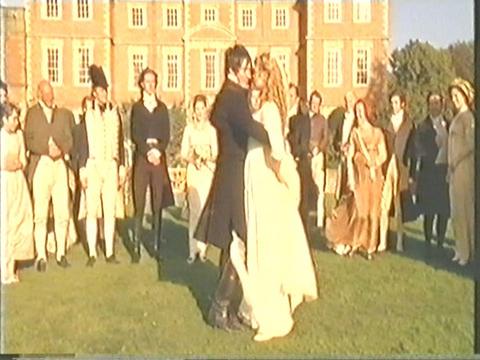
She: “Is it possible to be so happy?
He: “Let’s make it our business, Mrs Bertram, to be happy hereafter.”
These are the last spoken words of this movie. The film-makers may have saved on clothes in the 2007 Persuasion; in the 2007 MP the expensive item was the lovely wedding gown for Billie Piper (to which my still taken from a videocassette snapshot function does not do justice).
I also find much merit in at least two of the new films (the Northanger Abbey & Persuasion) and am wanting to see the 2007 MP uncut again. Tonight I’ll start Davies’s S&S. The New Yorker article about the movies across the four months (by Nancy Franklin, “Everybody Loves Jane”, January 21, 2008, pp. 82-83), takes up a repeat in variation of the attitude of the station. As I read the Franklin’s New Yorker comfortable facile scorn, I remembered the derision with which the Jane Austen Book Club was treated by most critics. The New Yorker female staff (particularly Joan Accocella) treats any signs of feminism with overt contempt, and this sweeping disdain for these film is a piece with that. Franklin sneers at the films and retells what happens in them mockingly, only bothering to be sure to tell the reader they have nothing to do with Austen. Not so.
As a group these minimalist Austen films (the Mansfield Park, Northanger Abbey, and Persuasion) speak to a new generation and the 2007 Persuasion in particular reminds me of the 2005 P&P and also the 2008 Atonement (same director, Joe Wright, same lead actress, Keira Knightley, as the 2005 P&P). They present a view of love and romance that is disquieting, but is one that is shouted from the rooftops of our culture at this moment. Young women I know or have been told of just loved the 2005 P&P, this Persuasion, and linked the former to Atonement. They burst into tears at the close of Atonement and Anne’s emotional pain in the kissing scene at the close of this Persuasion.
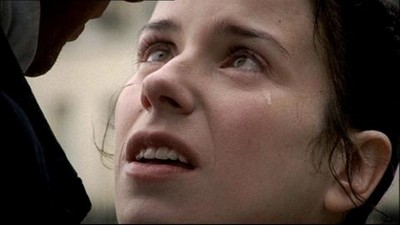
Anne Elliot (Sally Hawkins) and Frederick Wentworth (Rupert Penry-Jones) kiss (Persuasion, 2007)
Stars are chosen for psychological type and baggage and Keira Knightley is a icon that (alas) embodies something I heard described in a talk on Austen and post-feminism. This notion of love as a refuge, total sustainable, completely dependable refuge, a place well away from the hard world, and Austen as providing books which envision this. Anne Elliot will be content to be led blindfolded by her Captain; he will provide:
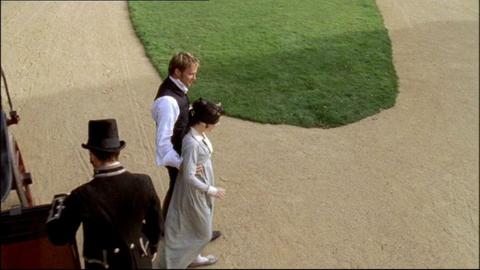
This tells us something about our culture today not to be dismissed.
It seems to me not unrelated to the supposed appeal of such dream visions in the US that it has one of the most punitive and regressive policies on reproductive health and services, parental leave, and all associated medical and social services offered to women in the developed world.
I will watch the new 2007 MP next week and then Miss Austen Regrets: to see the cuts in the former and because I’ve not seen the latter before and don’t know any other way to view it. My friend, Judy, has sent me the 2007 S&S by Davies so I can watch the British version on my TV@anywhere on my computer. I’ve seen Davies 1995 P&P and Emma already a number of times each.
Chava
--
Posted by: Ellen
* * *
Comment
- From Clare:
“I thought, at first, oh, come on Ellen. But having thought about it, I remembered the Baptist Belt (Is that right?). The Uk is much more secular these days, and sexual scenes don’t seem to raise much protest, except from the usual suspects, who seem to be largely ignored. As for the “not in the book”, well I just don’t get this criticism, as already discussed., how can a book be accurately made into a film – one would need to watch for days!
Clare”
— Elinor Jan 23, 7:32am # - From Luca:
“What I don’t like in this version of NA are the references to Lewis’s The monk (I’m not sure that Austen was really interested in “that” kind of gothic, something quite different from Radcliffe’s gothic) and to Byron: NA is settled in the last years of Eighteenth Century, at least 10-15 years before the Byron-mania (Byron’s first work, “Hours of idleness”, appeared only in 1806).
Luca”
— Elinor Jan 23, 7:36am # - Dear Luca,
It is painful to see (in the full-length version) Davies have Catherine burn Udolpho. This is a gesture which is reinforced in words which trash female gothic. He substitutes the most titillating lines from The Monk and presents it in scenes which are derisory of women’s sexuality: he makes them into silly creatures wanting to be played sadistic games with.
I know no film is really faithful to a book, and there is no argument from any standard of fidelity. What pains me is under the “guise” of an Austen film Davies hits out at women’s books, derides and presents a rather stupid version of women’s sexuality, and reinforces an ignorant attitude towards a great novelist of the era. Austen learned some of her subjective narrative techniques from Radcliffe too.
Ellen
— Elinor Jan 23, 7:40am # - I find it quite incredible that scenes were cut from productions which are already so short, where every moment counts. It is even more unbelievable that the cuts remain on the DVD of ‘Northanger Abbey’ – what possible excuse can there be for selling people a cut version? Usually DVDs tend to include extra material, deleted scenes etc, more rather than less!
I love the stills you have chosen, especially Henry throwing down the apples from the tree. It must be time I watched this production again – and ‘Persuasion’ too, which I loved but has faded in my memory.:)
I do agree the ‘Udolpho’ burning is upsetting. I was introduced to Radcliffe via Austen, and I think the same holds good for many readers, who want to see what the book is that fascinates Catherine so much.
— Judy Jan 23, 4:27pm # - I like your analysis of this situation. While I am an atypical Janeite (male, young, Baptist, and preferring the British telefilms to their big screen counterparts), the cavalier manner in which PBS has cut and released the DVDs has rather upset me.
I look forward to your views on Sense and Sensibility very much – I think it’s the strongest of the new films, in writing, acting, and filming.
I think that Austen does promote love – but not romance. I fume at those who see her as little more than the precursor to modern chick flicks, and cheap fodder to produce more of said flicks. Instead of the shoddy imaginings of soulmates and bad boys, Austen presents love as very hard work, not only in her heroines’ happy marriages, but also in the many marriages, happy or not so much, who appear along the way. But they are also about growth, and family, and society, and ideas. In short, while I reject the romance novel approach to Austen, I do see love as a major subject, and approved of by her when it is accompanied by virtue and respect on both sides.
On the book burning scene – I really don’t see Davies condemning or deriding women’s literature. Instead, I see him portraying Catherine’s simultaneously comic yet poignant self-blame, which is repudiated in the proposal scene when Henry affirms her instinct that the General was a vampire (and I think that this affimation doesn’t signify the necessity of male approval or some such – merely the affimation of one rational creature to another). Indeed, it was partly this scene which drew me to the film, as Catherine’s fundamental rightness was always a favorite part of the book, and to see this intepretation validated in an adaptation was great fun. Thus, while unnecessary, I don’t see the burning as a condescention so much as a character illustration.
Oh, and it’s the Bible belt – I go to school there (though I’m a northern, not a Southern Baptist).
— ibmiller Jan 23, 9:39pm # - From Elissa Schiff:
“Hi Ellen,
I watched about 4 mini-episodes on U-tube last night before the pyrotechnics of the Democratic debate. You are right!!! Those “lost” tiny scenes are often gems, e.g., a one-phrase solicitation of Catherine by a young man on the street just as she arrives in Bath with the Allens. Also the ~two-minute scene of Catherine and Mrs. Allen sitting alone and being sort of laughed at in the rooms at Bath from which they make a swift retreat and bump into Henry Tilney is a good one.
But watching this on the computer, with all the surrounding ads, is not something I would recommend as terribly pleasurable. Also, the videos are rather dark at points and hard to see, although there may be a way to change this.
Elissa”
— Elinor Jan 24, 3:02am #
commenting closed for this article
